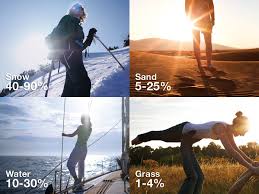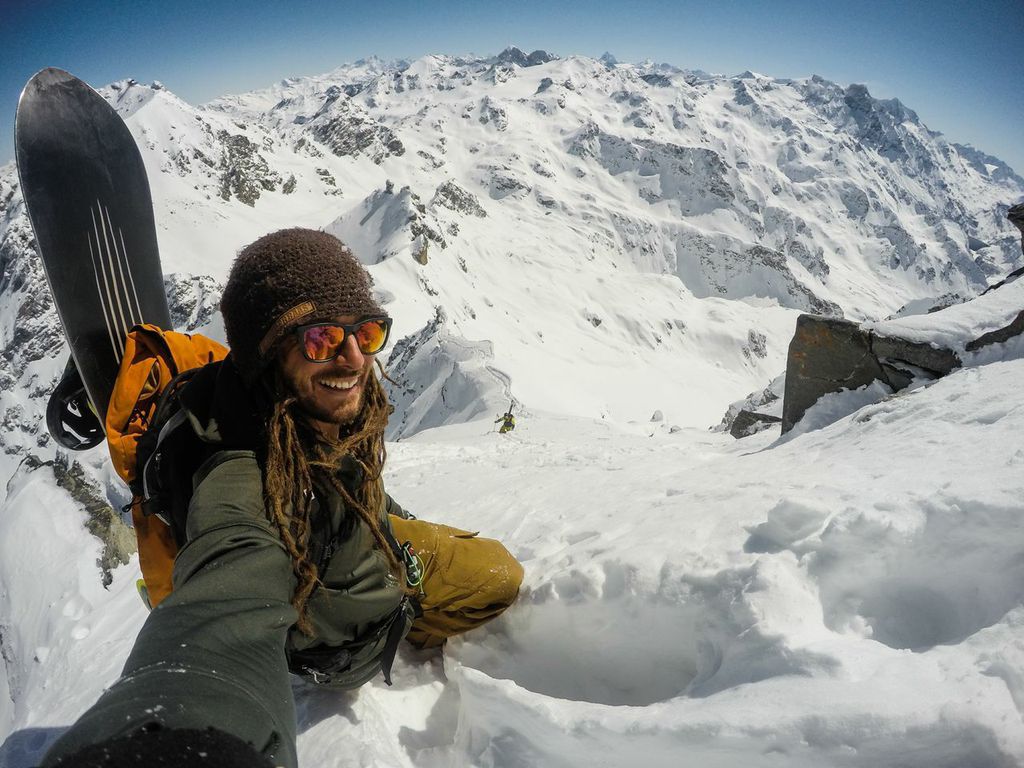What do you usually pack before hitting the powder for the day? You probably want to bring your board, boots helmet and winter gear. However, adequate eye protection is often under utilized when on the mountain. This is unfortunate as clean, fresh snow can reflect 90% of UV radiation. This gives skiers and snowboarders a double dose of UV exposure, leading to snow blindness or photokeratitis. Besides preventing snow blindness, other reasons you should wear sunglasses snowboarding include increasing contrast, protecting against frost, debris, and wind.
UV protection
As mentioned above, it's important to protect your eyes from enhanced UV rays. Snow reflects tons of glare, making it hard to see where you're going. Thus, its important to choose high quality sunglasses with tinted lenses. Tinted lenses are not only more stylish, but they improve contrast and reduce glare more than non tinted lenses. The Boss sunglasses are a new edition to the Nectar line and are meant for truly boss snowboarders and skiers. These glasses have 100% UV protection, polarized lenses and a lightweight frame making them sturdy. All snow sports inevitably will include falling and your glasses won't break with one fall. Also, these glasses have metal frames, which also enhances their style and durability.

UV reflection percentages per surface
Also, don't be fooled if it's cloudy on the hill. Many riders erroneously believe that clouds reduce UV, but 80% of UV rays still pass through clouds. This explains why some riders commonly get burnt on brisk, cloudy days.
Contrast
Glasses with good contrast allows you to distinguish small features like bumps and slopes. This is very important with snow sports as a bump or slope can greatly impact your ride. Various lens colors are not only stylish but can also increase contrast. Some colors especially amber, brown and rose, are more effective than others. For example, amber lenses are perfect for cloudy conditions or poorly lit trails. The most versatile lens color is brown because it can be worn in many weather conditions including hot, sunny weather. Brown lenses also filters blue light waves, which make it easier to see shades of green like trees and bushes. Lastly, rose colored glasses perform best in hazy, cloudy conditions.

Different Colors make an impact
Some other colors that have positive impact on contrast include black, violet and green. Each color is better during different conditions with black glasses being optimal for bright sunny weather. Black sunglasses block out the most UV rays, making them a great choice for cloudless days. However black glasses aren't a good choice during night sessions, or flat light sessions because they can impair your vision. The right pair of glasses can make obstacles such as moguls stand out easily, with violet lenses being the best choice. Violet lenses greatly enhance detail and can help snowboarders land the perfect air. Green lenses help increase your depth perception and are great for partly cloudy conditions. Also, green lenses reduce eye fatigue on especially bright days.
Protection against frost
Obviously, snow sports take place in cold weather, which can negatively impact your eyes. If you ride in especially cold climates, the extreme cold can restrict blood flow to your eyes and freeze your cornea. These conditions can result in severe pain, blindness, double vision, and blurred vision. It's best to return to warmer temperatures to prevent these conditions, but medication like NanoTears MXP Forte can help.

Medications, like Nano Tear brands are available over the counter and allow you to produce tears. This moisture helps repair your eyes for more days on the slope. Some people prefer certain brands of eye drops for dry eyes, but its a matter of personal preference. Most importantly, if your eye problem persists, you should see a doctor to determine the best course of action.
Debris and Wind
While snow sports are fun, they all carry the risk of injury. In fact, per John Hopkins University, 600,000 people per year are injured skiing and snowboarding. This stat can be alarming, but it shouldn't be meant to scare you. Instead, you should know that falling and accidents are inevitable, which are reasons why you should wear sunglasses snowboarding. Sunglasses will protect your eyes from debris, like twigs, sticks and rocks are common on the slopes. Thus, it makes sense to protect your eyes from debris by wearing sturdy sunglasses. You should find sunglasses that fit closely to your eyes and are durable like the Beryl model. The Beryl and Boss models are polarized glasses that are durable and won't break with one fall.

Beryl Model
Also, riders typically travel at higher speeds, usually between 10-20 mph. Elite, advanced riders speeding down the run can even reach a mind blowing speed of 150 mph. Even at 15 mph, this speed can make it easier to cause more damage if you hitting debris. Thus, its important to know how to fall correctly when riding. As a beginner, you should master this fundamental technique. If you fall forward, use your forearms to absorb the impact, not your hands and wrists. If you fall backwards, NEVER put an arm or hand behind you. Instead, keep your arms at your side, at roll onto one side of your body.

How to fall correctly
Along with cold temperatures, wind can greatly damage your eyes. Wind carries a variety of irritants like dust and leaves, which can damage your eyes. Also, wind exacerbates dry eye by causing tears to evaporate quickly. As discussed earlier, even amateur riders travel at relatively fast speeds, which can magnify the wind's impact on your eyes. Therefore, it's crucial to be aware of this and choose proper eye protection next time you bomb down a run.
Snowboarding and Skiing are great winter sports that provide a great adrenaline rush. Both have extensive amounts of equipment, making it easy to forget proper eye protection. However, proper eye protection is imperative because snow reflects high quantities of harmful UV rays. Some other reasons you should wear sunglasses snowboarding, besides looking trendy, are reducing UV exposure, increasing contrast, protection from the cold, debris and wind.



